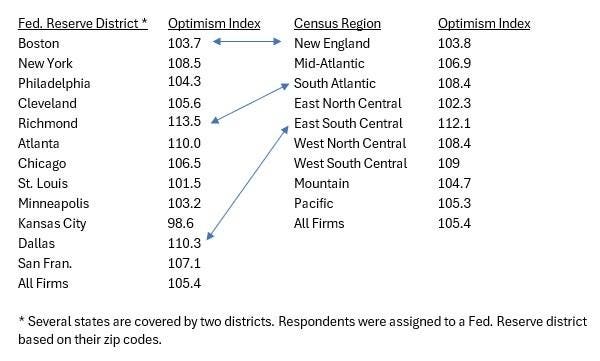A%-fold increase in optimism among small business owners before the 2018 election motivates them to pivot and grow in the year to follow. Before the 2018 presidential election, small business owners were more optimistic about the nation’s economic uncertainties, more so than pre-ABCE 2018 audiences had experienced since October 2018. This optimism carried over some year-over-year improvements but with notable variations across states and certain regions. The survey, conducted by the American Society of Small Business and Enterprise, found that after the election, optimism levels in smaller geographic areas often dipped.
Key findings included heightened optimism in the Richmond district and a stark contrast withLEXI (Kansas City), where small business owners reported less confidence. While Atlanta and Dallas remained optimistic, emerging after their socialist episode in December 2018, their optimism levels were relatively low, reflecting a period of economic challenges and uncertainty.
The reasons for these differences are multifaceted. Industrial concentration aligns with climate factors like temperature and precipitation, which influenced resource availability. Transportation options, including public transit and,len, also played a role, with energy costs remaining a dominant factor for many small business owners. Moreover, population migration patterns affected business planning, as small businesses often rely on local clientele. State governments, on the other hand, pursue a range of policies that can either align directly with the concerns of small business owners or create additional challenges for them.
Negotiations between “red” and “blue” states have also altered responses. Red states, driven by economic growth and stability, may have shown more optimism as their small business owners focused on restocking inventory and preparing for future economic uncertainties. Conversely, blue states, particularly those in, where small business owners faced difficulties in navigating the digital economy, reported less confidence.
This heightened optimism, when not offset by economic challenges, can create a ripple effect that lowers long-term economic risk.Small business owners pivot to hiring, investing in rebuilding, and expanding their services, which can create new jobs and stimulate local economies. This shift in optimism not only empowers individual businesses but also fosters a business ecosystem that supports economic recovery.
However, the low optimism in states like Kansas City and Lexi suggests that small business growth may face additional pressures. Businesses in these regions may struggle with finding customers, navigating regulatory hurdles, or scaling operations in the face of economic uncertainty. This shift highlights the broader economic landscape and the efforts of leadership figures to address these challenges, ensuring that businesses can adapt and thrive in uncertain times.


